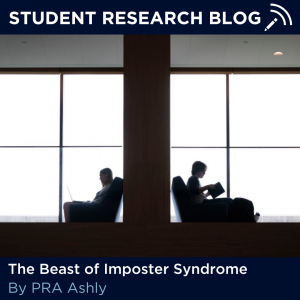 By Ashly Gasior, Peer Research Ambassador
By Ashly Gasior, Peer Research Ambassador
Who do you think of when you think of a researcher?
Personally, I think of a crazy genius who has never gotten a B and is graduating early. In reality, the vast majority of researchers are NOTHING like this… and yet we still compare ourselves to this gold standard.
There is no such thing as “smart enough” to do research. Research is creative and inspiring and rewarding… but it is also incredibly humbling. You will make silly mistakes, you will forget things, and there will be times you feel incredibly unqualified to do research. But mistakes are how you learn and grow, and it can be really tough to separate your worth from the mistakes you make. Imposter syndrome is when despite obvious evidence of your accomplishments, you still doubt your own success and abilities. This mentality can cause persistent feelings of anxiety towards your research, and poses a significant barrier for a large number of researchers!
So… how can we go about avoiding falling into the pit that is imposter syndrome?
- Remember, it is normal.
When you start getting really in your own head about your capabilities, it helps to step back for a moment, and remember that it is not just you. Almost everyone has doubts about the work they are doing, so your thoughts have nothing to do with your aptitude.
- Mistakes are GOOD!
My motto is “all information is good information” (see our recent post from PRA Andrei to learn more about making “new” mistakes!) If ten things don’t work, you know now ten more things about what you are studying! Yes, it may not be what you wanted, but before you find something that works, you need to know what doesn’t work. This also applies to silly mistakes like breaking glassware or setting something up wrong; good technique is a learning process!
- Keep track of what you’ve accomplished
If you’re doubting your own abilities, a point-blank way of approaching this is to make a list of all the awesome things you’ve done! Don’t disregard five accomplishments for one mistake.
And remember… if your research is taking too much of a toll on your mental health, don’t be afraid to reach out for help. I’ve included some resources here:
You’ve got this! The world needs your research and creative work.